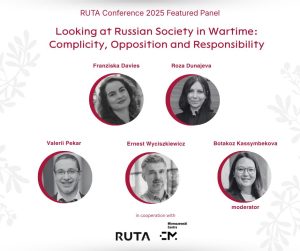Featured panel 3, Looking at Russian Society in Wartime: Complicity, Opposition and Responsibility

Featured panel 3, Looking at Russian Society in Wartime: Complicity, Opposition and Responsibility
28/06/2025; 10:45 – 12:15
This featured panel seeks to explore the socio-historical and political factors shaping Russian society’s behavior during the ongoing war. With a focus on the mechanisms of societal enabling of state-led violence, the panel will examine the interplay between collective attitudes, historical legacy, and the role of dissenting voices. A central theme will be the contentious issue of collective responsibility and its rejection by prominent members of the Russian opposition. Analyzing the dynamics of societal compliance, apathy, and active support for the war and Russian imperialism, the panel also aims to address the role of propaganda, imperial nationalism and complicity in shaping public behavior. Special attention will be paid to historical precedents that normalize wars of aggression, collective compliance and participation in genocidal conquest. The panel will bring together leading critics and opponents of Russian imperial violence to address the central question of how we should respond to narratives and behaviour that aim to avoid and escape historical accountability and societal responsibility?
Speakers: Franziska Davies, Roza Dunajeva, Valerii Pekar, Ernest Wyciszkiewicz
Moderator: Botakoz Kassymbekova
Franziska Davies is assistant professor of Eastern and Central Eastern European History at the History Department of the Ludwig Maximilian University of Munich. Her research focuses on the modern history of Ukraine, Poland and Russia. In 2023 she published the edited volume „Ukraine in Europe. Dream and Trauma of a Nation“ and in 2022 she and Katja Makhotina published their book „Eastern Europe’s Open Wounds. Travels to the memorial sites of the Second World“ which was awarded the Bavarian Book Prize in the category „non-fiction“.
Roza Dunajeva is a human rights activist and a representative of the Chechen Republic of Ichkeria in Austria. She was born and raised in the Chechen Republic of Ichkeria. Her youth coincided with the years of two bloody wars, which she witnessed. She lived in the very center of Grozny, survived the bombings, the blockade, the loss of my home and relatives. Despite everything, she completed her pedagogical education and from a young age worked at the 41st school of Grozny, where she taught Russian language, literature and English. After moving to Austria, she was faced with a new reality: here, refugees have a voice. They can speak openly, fight for their rights and for the rights of their compatriots in exile. Over time, she became an active participant in the human rights movement and today she represents the Chechen Republic of Ichkeria in Austria.
Valerii Pekar is adjunct professor at business schools and schools of public management in Kyiv and Lviv. Researcher of developmental models of human thinking, management and societies, author of 5 books. Member of the National Reforms Council (2014-2016), advisor to ministers of economic development and trade (2014-2016), a member of the Public Administration Reform team (2017-2018).
Ernest Wyciszkiewicz is the director of the Centre for Polish-Russian Dialogue and Understanding (Warsaw-based public entity), formerly Senior Research Fellow, Energy Programme Coordinator at Polish Institute of International Affairs (PISM), Warsaw; 2003-2009 Managing Editor of “Evropa” Russian–language quarterly on European Affairs; 2012-2014 Lecturer on energy security and political economy of oil and gas at Collegium Civitas, Warsaw; author, co-author and editor of books, articles and reports on EU energy and climate policy, Russian energy policy and energy security, PhD at Maria Curie-Skłodowska University (UMCS) in Lublin.
Botakoz Kassymbekova is professor of Eastern European History at the University of Zurich. She studied in Bishkek and Essex. Botakoz Kassymbekova completed her doctorate at Humboldt University Berlin and worked as a postdoc in Berlin, Liverpool and Basel, as well as a guest scholar at Columbia University, New York. Her research focuses are Soviet history, Stalinism and post-Stalinism, and Russian imperial history. Her first book Despite Cultures: Early Soviet Rule in Tajikistan (Pittsburgh University Press) traces Soviet imperial strategies in Central Asia and analyzes how dictatorships communicate and enforce their rule across great distances.
This panel is made possible with the support and in partnership with Centrum Mieroszewskiego.